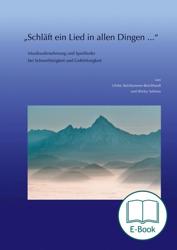Music oriented learning processes and musical experiences are interrelated. But what remains of music when one can only hear badly or not at all? How is music accessible to the hard-of-hearing and the deaf, and what insights can music teachers and therapists gain from this knowledge? This book provides an interdisciplinary exchange between the natural sciences and music education and therapy.
“A song lies dormant in everything
That ever dreams and dreams away,
And all the world would start to sing
Could you but find the magic word.”
(Josef von Eichendorf 1788 – 1857, transl. Margaret Murray)
Music oriented learning processes and musical experiences are interrelated. But what remains of music when one can only hear badly or not at all? How is music accessible to the hard-of-hearing and the deaf, and what insights can music teachers and therapists gain from this knowledge?
This book provides two very different approaches to these questions. The first section presents a scientific research project investigating the foundational elements of music perception among the hard-of-hearing and deaf. The second section details the use of play songs in teaching hard-of-hearing and deaf children. It combines music, movement, language and play. The multi-sensory aspects of music perception that were discussed in the first section find their practical application in section two.
Research into music oriented learning processes is considered an empirical and analytical method in the field of music education and therapy. This book provides an interdisciplinary exchange between the natural sciences and music education and therapy.
The subject of the text and the questions involved are derived from the extensive practical experience of the authors. Both are driven to understand the mechanisms of music perception that lie at the root of the issue. How does one develop the pedagogical method, what are the influential factors, and how can they be expanded upon? The authors demonstrate how theory and practice complement one another and result in new stimuli for the further development of the field. Looking into the issue of “not being able to hear” also sheds light on what it means “to be able to hear”, and this book will thus prove particularly useful for those who are interested in a multi-sensory approach to music. Experiencing music with all of the senses serves as the foundation for a holistic music comprehension in both educational and therapeutic fields.
„Die letzte Zeile von Eichendorfs Gedicht lautet: „Triffst du nur das Zauberwort.“ Das vorliegende Buch macht deutlich, dass es im wesentlichen darauf ankommt, es zu treffen: Das Zauberwort - oder die Zaubergebärde; denn wäre Eichendorff ein gehörloser oder schwerhöriger, gebärdender musizierender Dichter gewesen, hätte sein Gedicht vielleicht folgendermaßen geendet: „Die Welt hebt an zu singen/ triffst du nur die Zaubergebärde!“
Von: Gunda Schröder
In: Orff Schulwerk Informationen 88, Sommer 2013, S. 92-94.
Dr. Ulrike Stelzhammer-Reichhardt studierte Musik- und Bewegungspädagogik in Wien und Salzburg im Schwerpunktfach Musik und Tanz in sozialer Arbeit und integrativer Pädagogik bei Shirley Salmon. Seit dieser Zeit arbeitet sie mit schwerhörigen und gehörlosen Kindern, Jugendlichen und Erwachsenen. Zwischen 1992 und 1996 wurde Ulrike Stelzhammer-Reichhardt in die Rehabilitationsphase nach Cochlea-Implantation bei Kindern einbezogen. 1997 bis 2002 war sie mit der Mitorganisation und Durchführung von Sommerwochen für Therapie und Kultur für Familien mit hörbeeinträchtigten Kindern betraut. Von 2004 bis 2007 Forschungsarbeit an der Musikuniversität Mozarteum in Kooperation mit der naturwissenschaftlichen Fakultät der Paris-Lodron-Universität, Salzburg. 2007 Promotion zur Doktorin der Naturwissenschaft. Weitere Arbeitsschwerpunkte sind Referenten- und Vortragstätigkeit im Bereich Elementarmusikpädagogik sowie die Verfassung wissenschaftlicher Texte.
Shirley Salmon, geb. in London, studierte Musik (B.A. Hons) an der York University, England; am Froebel Institut, London (mit Abschluss “Postgraduate Certificate in Education”, London University) und Erziehungswissenschaften (Mag. phil) an der Universität Innsbruck.
Derzeit Vertragslehrerin in der Abteilung für Musik- und Tanzpädagogik - „Orff-Institut“, Universität Mozarteum Salzburg, und an den Pädagogischen Akademien, Graz. Nationale und internationale Fortbildungstätigkeit.
Forschungsschwerpunkte: Musik- und Bewegungserziehung bei gehörlosen und schwerhörigen Kindern, in Integrationsgruppen und bei Menschen mit Schwerstbehinderung.


 Table of Contents
Table of Contents